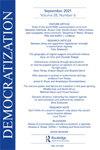Populism and civil–military relations
IF 2.9
1区 社会学
Q1 POLITICAL SCIENCE
引用次数: 0
Abstract
Scholars largely view populism as a democratic game and study it through the lens of civilian mass politics, thereby, dismissing the role of the military elite. Nevertheless, populist mobilization may introduce new dynamics into the political landscape of countries that have a long history of politically active militaries. This article scrutinizes the degree and type of civilian control of the military in populist settings. It primarily contends that incumbent populists tend to limit the veto power of the military. However, civilianization in populist regimes does not occur through a consistent reform agenda geared towards democratic governance of the security sector. Populists instead seek to gain personal control of the military through individual, communal, or ideological ties to civilian leadership. The personal model does not aim to hinder the military’s political influence. On the contrary, it politicizes the army and seeks to use it under civilian authority towards shared goals. However, populism operates on shaky ground due to the institutional decay it causes.民粹主义与军民关系
学者们大多将民粹主义视为一种民主游戏,并通过平民大众政治的视角进行研究,从而忽视了军事精英的作用。然而,民粹主义的动员可能会给那些长期以来在政治上活跃的军队的国家的政治格局带来新的动力。本文详细分析了民粹主义背景下文官对军队控制的程度和类型。它主要认为,现任民粹主义者倾向于限制军方的否决权。然而,民粹主义政权的平民化不是通过面向安全部门民主治理的一贯改革议程实现的。相反,民粹主义者寻求通过与文职领导人的个人、社区或意识形态联系来获得对军队的个人控制。个人模式并不是为了阻碍军方的政治影响力。相反,它将军队政治化,并寻求在文官当局的领导下利用军队实现共同目标。然而,民粹主义的运作并不稳固,因为它导致了制度上的腐朽。
本文章由计算机程序翻译,如有差异,请以英文原文为准。
求助全文
约1分钟内获得全文
求助全文
来源期刊

Democratization
POLITICAL SCIENCE-
CiteScore
6.40
自引率
12.50%
发文量
73
期刊介绍:
Democratization aims to promote a better understanding of democratization - defined as the way democratic norms, institutions and practices evolve and are disseminated both within and across national and cultural boundaries. While the focus is on democratization viewed as a process, the journal also builds on the enduring interest in democracy itself and its analysis. The emphasis is contemporary and the approach comparative, with the publication of scholarly contributions about those areas where democratization is currently attracting considerable attention world-wide.
 求助内容:
求助内容: 应助结果提醒方式:
应助结果提醒方式:


